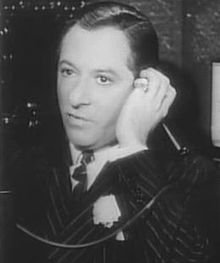George Jessel (actor)
| George Jessel | |
|---|---|

Jessel in the film Stage Door Canteen (1943)
|
|
| Born |
George Albert Jessel April 3, 1898 New York City, New York, U.S. |
| Died | May 23, 1981 (aged 83) Los Angeles, California, U.S. |
| Cause of death | Heart attack |
| Resting place | Hillside Memorial Park Cemetery, Culver City, California |
| Other names | Georgie Jessel |
| Years active | 1919–80 |
| Spouse(s) |
Florence Courtney (m. 1923; div. 1932) Norma Talmadge (m. 1934; div. 1939) Lois Andrews (m. 1940; div. 1942) |
| Children | 2 |
George Albert "Georgie" Jessel (April 3, 1898 – May 23, 1981) was an American illustrated song "model", actor, singer, songwriter, and film producer. He was famous in his lifetime as a multitalented comedic entertainer, achieving a level of recognition that transcended his limited roles in movies. He was widely known by his nickname, the "Toastmaster General of the United States," for his frequent role as the master of ceremonies at political and entertainment gatherings. Jessel originated the title role in the stage production of The Jazz Singer.
Jessel was born on 118th Street in Harlem. By age 10, he was appearing in vaudeville and on Broadway to support his family after his father's death.
His mother, who worked as a ticket seller at the Imperial Theater, helped him form The Imperial Trio, a harmony group of ushers to entertain patrons of the theater, with Walter Winchell and Jack Wiener, using the stage names Leonard, Lawrence and McKinley, in their early teens (such usher-singer groups were common). At age 11, he was a partner of Eddie Cantor in a kid sketch and performed with him on stage until he outgrew the role at age 16. He later partnered with Lou Edwards and then became a solo performer.
His most famous comedy skit was called "Hello Mama" or "Phone Call from Mama," which portrayed a one-sided telephone conversation. In 1919 he produced his own solo show, "George Jessel's Troubles" and appeared in his first motion picture, the silent movie The Other Man's Wife. He co-wrote the lyrics for a hit tune, "Oh How I Laugh When I Think How I Cried About You," and performed in several successful comedy stage shows in the early 1920s. In 1921 he recorded a hit single, "The Toastmaster." He sometimes appeared in blackface in his vaudeville shows.
In 1924, he appeared in a brief comedy sketch, possibly the telephone sketch described above, in a short film made in the DeForest Phonofilm sound-on-film process.
...
Wikipedia
